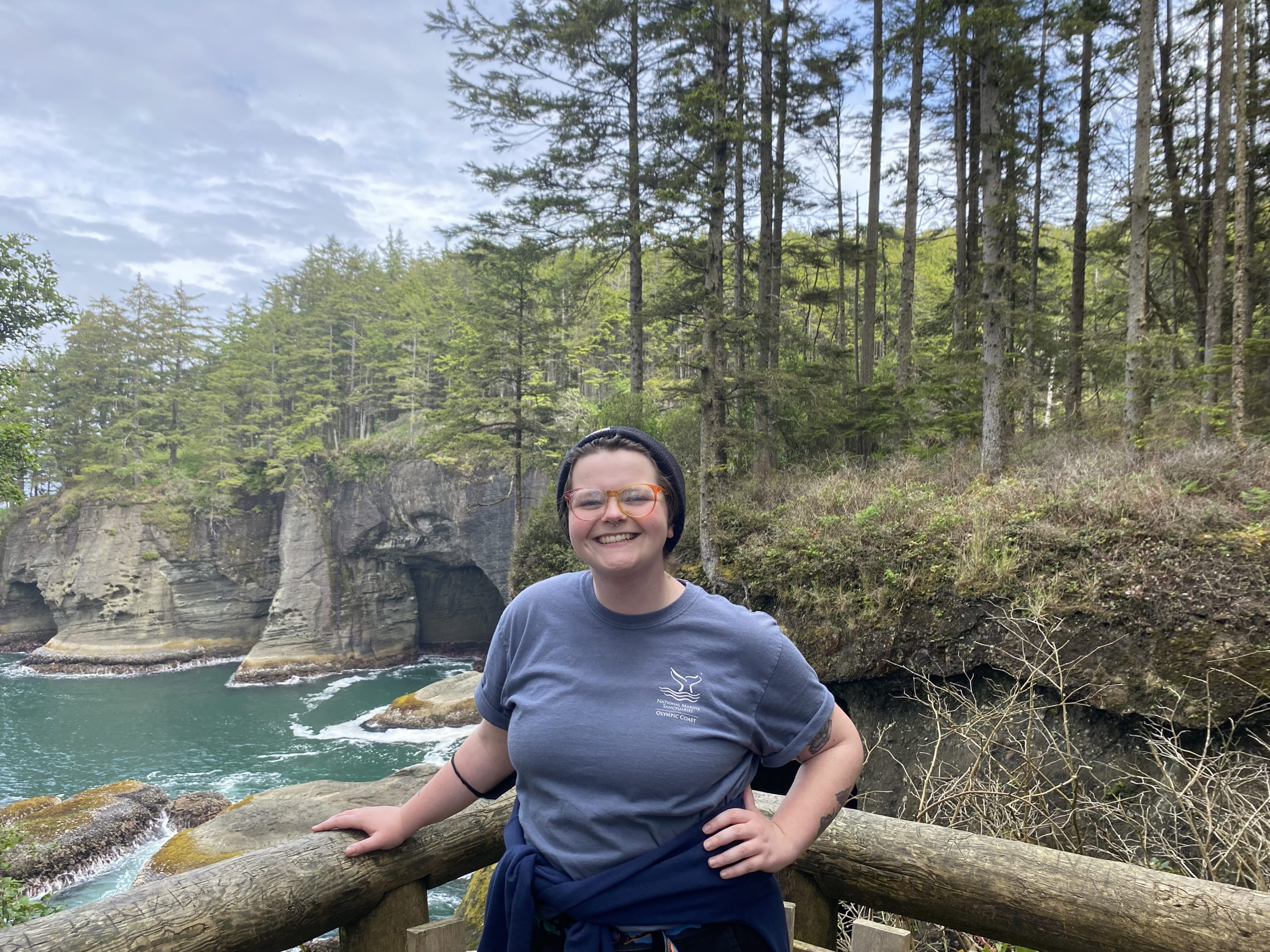
Pride In The Ocean: Q&A with Ken Cameron, Anna Marchand, and Mark Losavio
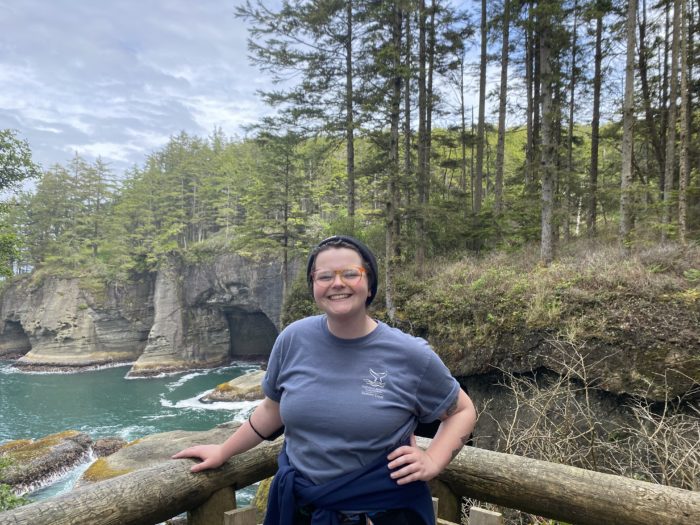
Ken Cameron enjoying a day in Olympic Coast National Marine Sanctuary. Photo credit: Ken Cameron
Written by Kennedy Cameron (they/them/theirs); Environmental Education and Stewardship Specialist, Washington Service Corps member at Olympic Coast National Marine Sanctuary
Celebrating LGBTQ+ Pride Month can look like a lot of different things, from parades, to self-reflection and volunteering. However, this year, for me as a Washington Service Corps member serving at Olympic Coast National Marine Sanctuary, Pride Month included grant applications, question brainstorming, flier making and sending many many emails. In the end, all of this work materialized in the form of the Pride In Marine Fields webinar, a national webinar that highlighted the careers of four LGBTQ+ folks in various marine fields! Myself, as well as fellow Service Corps Member Anna Marchand (she/her) and Mallows-Bay Potomac National Marine Sanctuary Media/Outreach Coordinator Mark Losavio (he/him) were behind the scenes before and during the webinar to make it happen. Now we are taking the opportunity to reflect and answer some of the questions we asked our panelists!
How has your perspective as an LGBTQ+ person positively impacted your work?
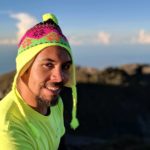
Mark Losavio (he/him): I’m not sure if this is an experience that other people share but I think my unique perspective in the marine sciences field has made me very good at communicating science to a wide variety of audiences. I like to think that my constant need for code switching has made me good at adapting a message to different people.
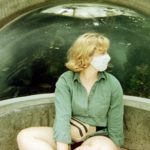
Anna Marchand (she/her): I think that my experience with queerness has really opened me up to ideas that lie outside of our collectively constructed binaries and norms. This gives me a richer understanding of complex concepts that cannot be easily described in binary terms, and helps me examine my assumptions about the world. These qualities make me a better scientist and communicator.
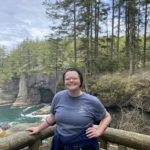
Ken Cameron (they/them/theirs): I feel like I am more likely to accept things as they are instead of putting them into a preconceived box. Once you realize that gender is not binary, it is much easier to see shades in more situations and have a more complete understanding of what is happening.
What is some advice that you have for students?
Anna: I would recommend following your passions, even if they do not create a linear career path. If you think an internship or gig would be fulfilling, don’t cheat yourself out of the experience just because it isn’t part of your “plan”. Similarly, don’t be afraid to take opportunities that are adjacent to your interests, as these can often lead to interesting connections and conversations that can help you towards your chosen career.
Ken: Don’t be afraid to be weird or do something different! Everyone will have a different path in life, there isn’t a linear way from point A to point B, so you should prioritize being true to yourself and your interests. Care less about what everyone else is doing and focus on what makes you happy and healthy!
Mark: Definitely try to leverage the unique aspects of your experiences. What about your career path sets you apart from your peers? Did you have a summer job that might seem completely unrelated to marine science? Show how that experience contributes to your career anyways!
Can you talk about your experience with mentorship as you advance to the stage you are currently at? How significant was this mentorship to your development?
Ken: I always appreciate having someone in my corner, and I feel like my mentors have been that person a lot of the time! Having someone who wants you to stay true to you, but can still help you learn and grow is very important. My teachers and professors have been some of my most important mentors, but also work managers. Try finding folks that interest you and ask them questions about how they got where they are!
Mark: I’ve had a number of mentors who are all very different. Some were really eager to push me into situations that might be difficult but ultimately beneficial, while others were really good at standing back and supporting my own efforts to succeed. The challenging part is finding those mentors who have a vested interest in you, which can take a lot of work in some cases. They don’t necessarily need to be your advisor, teacher, or supervisor.
Anna: I feel like mentorship has been essential to getting me to this stage in my career. Some of my best and most influential mentors have been my college professors. If you are still in school, I recommend fostering relationships with your professors, whether through research, TA positions, or even just attending their office hours and talking about your career plans. Beyond mentorship, think carefully about who you chose to work for– picking managers that work well with you can really improve a work experience.
What is your favorite thing about the ocean?
Mark: My favorite thing about the ocean is that there is always something amazing to talk about. Even the smallest, most nondescript shrimp can hide an amazing and engaging story. It’s great for people like me who never really know when to stop talking! I also just love crabs. Like they’re so cute how can you not!
Anna: I love the mystery of the ocean! There is so much we don’t know, and I find that really exciting.
Ken: I love the potential of the ocean! Humans can have a beautiful reciprocal relationship with the ocean and I hope to see us live up to that potential.
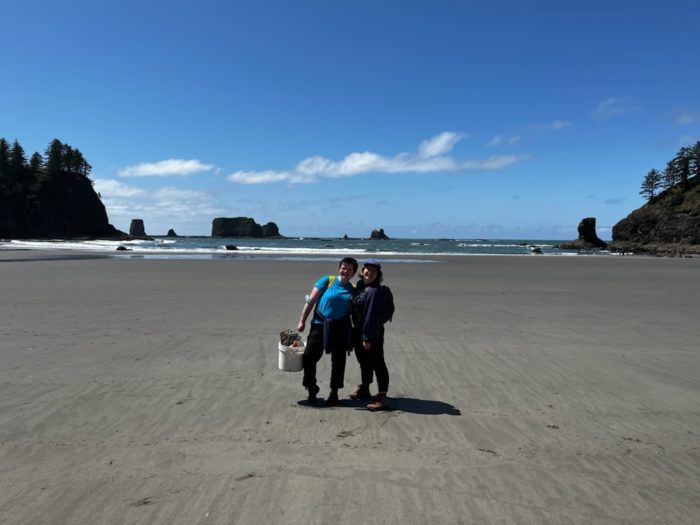
Ken Cameron and Anna Marchand exploring the shores of Olympic Coast National Marine Sanctuary. Photo credit: Ken Cameron
